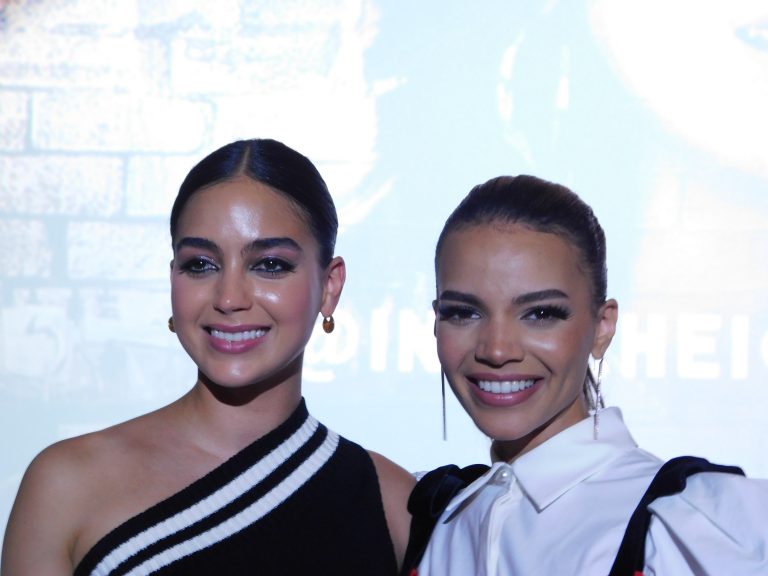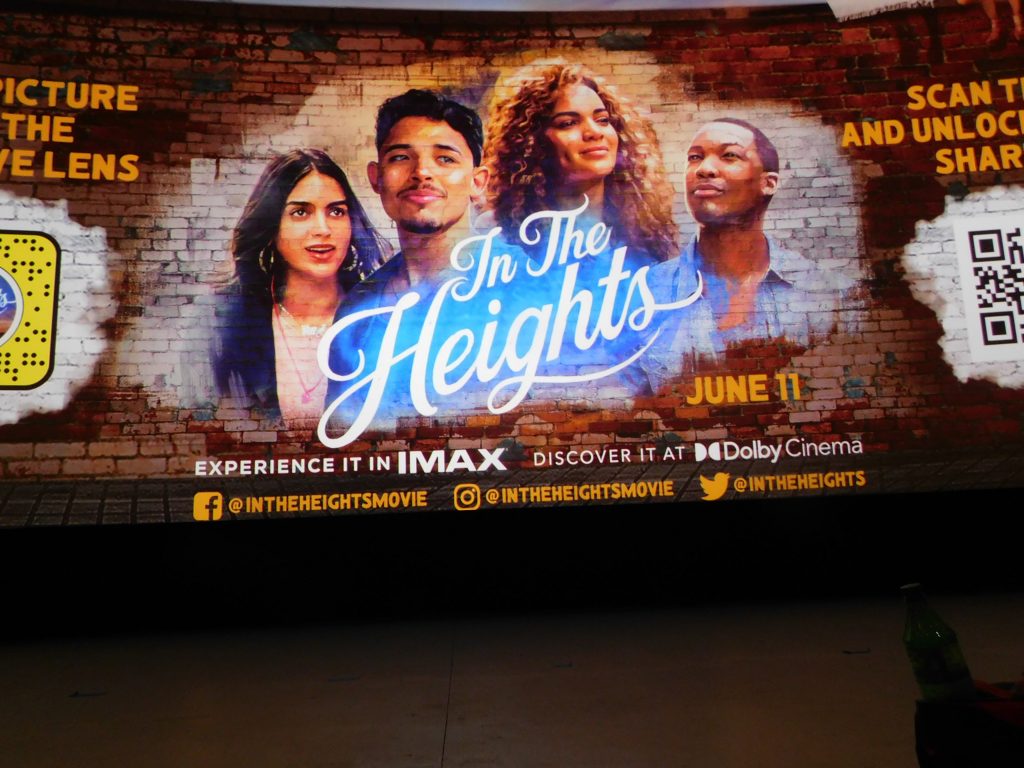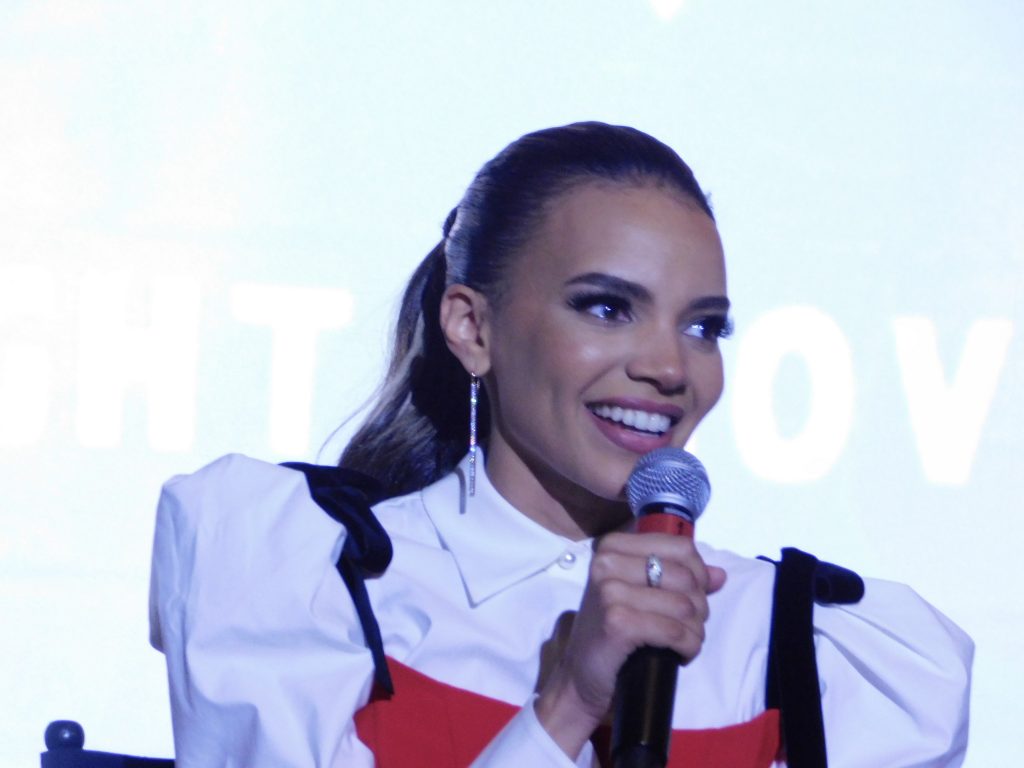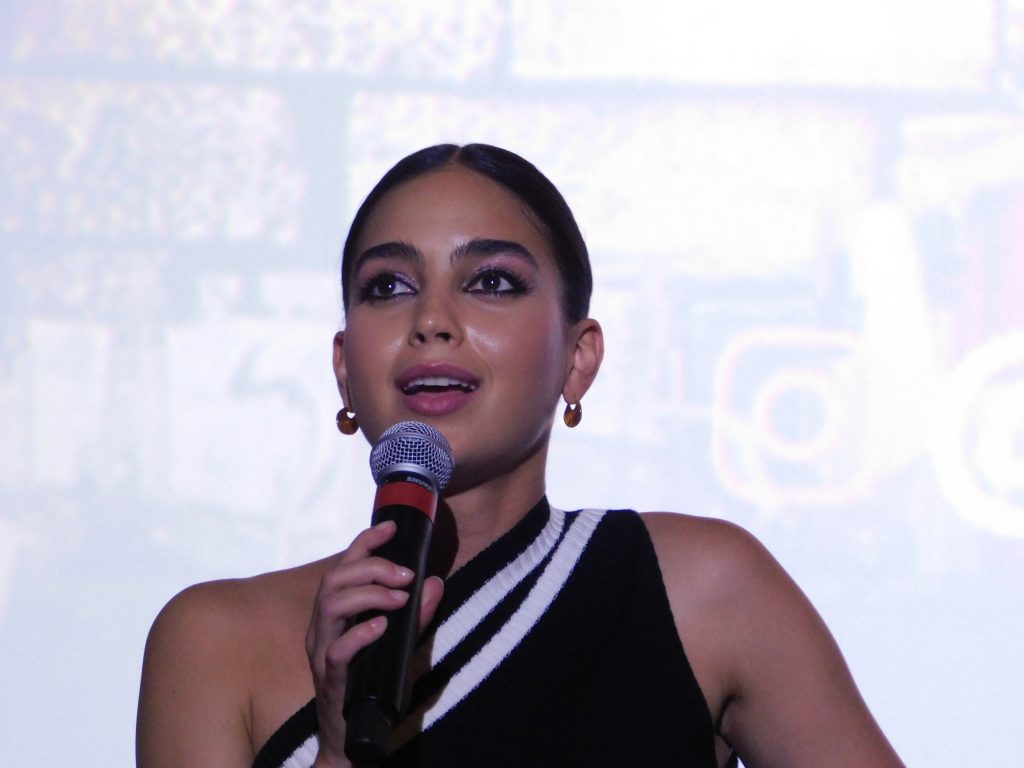
Preceding its world premiere at The 2021 Tribeca Festival, the musical celebration, In The Heights, enjoyed a special screening for the influencer set at the AMC 42nd St. the night before. Both the film — and the musical it’s based on — centers on Washington Heights, a primarily Latino neighborhood on Manhattan’s northwestern tip. At its center is bodega owner Usnavi de la Vega (Anthony Ramos), who looks after aging Cuban matriarch Abuela Claudia, pines for gorgeous Vanessa (Melissa Barrera) from the local beauty salon and dreams of escaping to his native Dominican Republic (if he wins the lottery).
Meanwhile, Nina Rosario (Leslie Grace) —Usnavi’s old friend — has returned from her first year at Stanford telling father Kevin that she’s dropping out. Ultimately, Usnavi and the residents of the close-knit neighborhood get a dose of what it means to be home.
Interwoven throughout the film are the energetic song & dance numbers and the lives of Kevin Rosario (Jimmy Smits), who runs the taxi company; Kevin’s employee, Benny (Corey Hawkins); the salon ladies Daniela (Daphne Rubin-Vega), Carla (Stephanie Beatriz), and Cuca (Dascha Polanco); and Usnavi’s cousin Sonny (Gregory Diaz IV), who he employs.
Debuting in theaters and on HBO Max June 11, this cinematic event fuses Lin-Manuel Miranda’s kinetic music and lyrics (through Quiara Alegría Hudes’ screenplay) with Crazy Rich Asians director Jon M. Chu’s lively and authentic eye for storytelling. Both capture a world very much of its place, but universal in its experience.
To much applause and appreciation, Chu stepped out to introduce the film. The audience was also told to stay around since two of the lead actresses — Leslie Grace and Melissa Barrera — would handle a post-screening Q&A. The 30-year-old Mexico-born star Barrera is still basking in the glow of playing Vanessa while the 26-year-old singer Grace acknowledged the challenges of fitting in as an Afro-Latino woman and artist.

Q&A with actresses Melissa Barrera and Leslie Grace
Q: How did you feel going on the film and how did you feel while making it?
LG: We all felt like we were going to be game-changing. We all felt like we were part of something historic and momentous and timely. I personally felt that I was paying homage to the people that raised me up because this story hit so close to home for me. I related to the community that I know is the community that my mom raised me up in.
My mom was a real-life salon lady — her first salon was a couple blocks away from where we shot all summer. And I grew up [living with that as] a pattern. I walked into that place, I knew women that worked there. Also, going out into the world and feeling fragmented because it wasn’t always — it didn’t always feel that I had acceptance everywhere I went. So I really related to Nina and just felt so blessed for even knowing the people that knew me along the way. Now, it’s surreal for me to think of being a part of this also.
MB: Can I just say thank you for being here? Definitely it felt important while we were shooting it. I was a huge fan of the show since it was on Broadway, I went to the school for musical theater. My biggest dream was to be in that show. And so being a part of the group now for me is crazy.
I used to pray since I was 17 years old, I’d say “Thank you God” every night that I am Vanessa in In the Heights. Literally, that’s the wording that I would say every night since I was 17 years old. And 10 years later, I got cast in In the Heights for real. It was so amazing to know that you’re going to be a part of something that means so much to so many people that have never felt seen in a major Hollywood movie like this — or celebrated, or like their stories and their voices are important.
After watching “Crazy Rich Asians” a few years ago, I left the theater thinking, “I want that too.” You know? I celebrate the Asian American community because I feel like any minority, we all write the same stories. I related to that movie so much. When they were making dumplings around the table, I thought, that’s like us, that was what we do. So I love how communities are coming out and supporting this movie, because it’s an American story. And it’s about time that we have something like this that honors the contributions of a certain community to this nation, which are huge.
Q: Can you recall making the film in 2019 — especially in doing your big dance numbers?
MB: It was the first day of production and it was my song that we started with. I was so nervous because you’re always nervous on your first day, but I was even more nervous because it was a big dance number. I was so worried about remembering all the steps and the choreography.
I was just getting touched up and then all of a sudden Lin walks up and he has his phone and he’s like, ‘Hey, Mel, I have a surprise for you. And I was like, ‘What?’ He’s like, ‘Someone wants to talk to you.’ And it’s [original In the Heights actress] Karen Olivo on FaceTime. I just dropped to the ground. My legs just gave out and I was like, “Oh my God.” She wished me luck. She was so sweet. It really gave me the confidence I needed to start that day.
Q: How much of it played out in your daily life and as an actor?
MB: For me, it took awhile to get to Vanessa’s style, because she wants to be a fashion designer. We would talk about, well how much were the clothes that she’d make, or how does she add a little thing that makes it a little more creative, you can see it like a little edge, or does she just like to do super-casual. Her release is through her designs. Her limitations are what she can afford; she rummages through trash cans and things like that for her fabrics and all that stuff.
As an actor, I find myself in the clothes of the character, [that’s where] I find the character. It’s a super-important — it’s a key thing to find how the character moves and when they are feeling vulnerable, how they dress. And, when they’re feeling fierce, how they’re dressed. It’s all emotional, and it’s very informative of the character.
I would get dressed and be like “No, this isn’t Vanessa” and when we found that first outfit — the opening outfit — I was like, “Ohhhhh,” and immediately it was like, “Yeah, this is her.”
LG: Our wardrobe was super-important to us — to all of the team. They really took the time to discover… To have a conversation with us and ask, “Who do you think this person is?” They listened to us, and to what we were working through in the dance rehearsals, and what our movements were. They had to keep a lot in mind of what we would be doing.
I remember for [the number] “When the Sun Goes Down” we spent a lot of time on that outfit because we’re supposed to defy gravity. We couldn’t have anything dangling — like tassles — everything had to be pasted on — Corey as well. So those costumes, the earrings, all those little details [we] had to bear in mind.
But also with the arc of my character, Nina, you’ll see at the top of the movie, the story of her. She’s coming from Stanford where she has to… You see that she has conformed to what she thinks [is acceptable] — the hair, being thin a strait-laced girl. Nothing wrong with that. But you can tell that Nina’s has her fear of it going wrong for her, she’s got that little California vibe, and then, on her block again, you see her hair little by little [change]. I loved that we were able to plan that with the team.

Q: What were some of the most challenging things that otherwise you couldn’t tell about — tell us here.
LG: I feel we’ve all been so open about our journeys with this movie, with even the most embarrassing things. Like a 20-minute panic attack that I had while we were rehearsing for a dance number and I cried. I shared and it worked. Part of my journey with this movie of being able to do that club number and that salsa number. I never in a million years thought that I would be able to do that. No.
They would show me the choreography and I’d be like, “Good for you, when’s the dance done? I am never going to be able to spin that fast.” And it took me eight weeks of intense rehearsal. I was also overcoming a personal block of my own doubts in my capabilities that was making me not able to do a certain thing. Eventually, after holding it in for so long, I just had to let it out. It’s never healthy to hold things in. So I let it out and cried in the bathroom for 20 minutes. Our amazing PA Virginia came and she was like, “Yes,” she was rubbing my back, “Yeah, let it out, let it out.” She got me Kleenex, we hugged it out and then we went back in the room. And I nailed it.
It was, like [really tough], but I’m also proud of what I overcame. I realized that we are capable of so much more than we give ourselves credit for. It’s important to push through your own — what you think your limitations are, because you find incredible things on the other side of fear.
Q: You identified with your Nina character?
All the time, in so many parts of my life I’ve felt that I wasn’t being Latina enough, not being American enough, being first-generation the same way that Nina is. So a lot of the themes in Nina’s character I really related to.
MB: I was just going to add to what [Leslie] just said. The story is for all of us, whether you saw it on stage at a theater or something or just seeing the movie for the first time, with the story and the people in the story and with everyone who went through making this film.
At some point we all have felt the validation of you are capable of this. You are capable of achieving things beyond what the world has told you that you can dream. And it changed my life. It changed all of our lives. It’s beautiful now to know that this is how to live in the world that we can be happy [which is expressed in every one of those numbers.] It was a huge challenge but it was so worth it. You break out and break those limitations for yourself.
Q: Can you comment on parallels between this and “Crazy Rich Asians“, because I saw a lot of different parallels throughout the movie. Do you have any thoughts on that?
MB: I feel that for one, there’s John M. Chu. So you have, I guess, a similar aesthetic. The vibrancy of the way that he shoots movies, the color that he uses, you feel like the world is alive.
LG: That’s the magic of Jon M. Chu. He has a way of capturing the beauty of the world and seeing the most beautiful side of every place. He listens a lot.
MB: With Crazy Rich Asians, he comes from a Chinese family so he had really a lot more knowledge. Here, he came on knowing that he didn’t live in Washington Heights and didn’t grow up there, that he was not a part of that community. So how can he be respectful, and how can he help us portray it in the most authentic way possible. That’s probably where you see all the similarities, in the authenticity and the honesty. You have big, splashy epic moments in both movies, and you have the really small, intimate moments that contrast, that ground you given to the magical realism that happened in the characters’ dreams and songs.
And you have the family aspect. That’s a parallel. In any community, the family is such a huge part of who we all are, and I think that’s a chief part of this movie. They’re family despite them not being blood related, they are still family to each other. They uplift each other. Jon is a family man, His family is all here for the premiere. They’re always with him, and he knows that.

Q: What do you hope people can take away from this film?
MB: First and foremost, I hope that people enjoy it, that they laugh and dance and cry. But on a deeper level, no matter where they’re from even if they’re not from Washington Heights, that these characters’ stories and dreams [make someone feel] seen and validated no matter how big or small their dream is. There’s so much magic to what Lin writes and what Quiara writes, and what Jon directed here. He really took this story and made it accessible for everyone to relate to. You feel like you can dream.
Corey wants to appreciate and protect his neighborhood. Or Usnavi says, “This is my island. I don’t want to go to no other island. This is it for me.” He wants to go back to where his parents are from and where he doesn’t have that many memories, but feels that’s where the magic is, He eventually finds it right where he’s at. All those dreams are validated. That’s the vehicle that’s so beautiful.
LG: I hope that people find the warmth and the deliciousness of getting to know a community that maybe you’re not exposed to, finding how you’re similar despite growing up in different places of the world, and despite our families looking different. That’s something that I would love for people to leave the theater thinking like “Oh wow, I’m a zombie! And I grew up in Michigan and I’m white.”
What makes me the most hopeful about this movie is thinking about the younger generation — about the kids that are going to watch this movie. Especially the young kids who are going to watch this movie and that this is going to be normal for them.
I never saw myself in a major Hollywood movie when I was a kid. There was no one ever that looked like me. For little kids to have this reference and know that this is a possibility for them, to always know that they have a place. They can dream as big as they want to dream, and that anything is possible. That, for me, is what t[this film is all about]. I would love for a kid to come out of seeing the movie thinking that they are visible.

